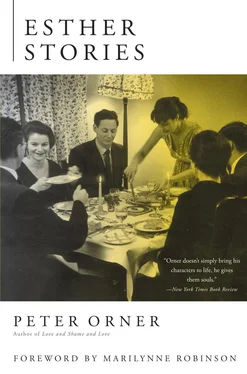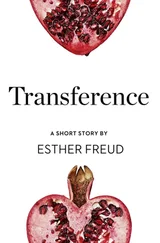Watching, jealous already, my father stands in the corner of the room near the bar and talks to one of my grandfather’s friends about his future plans. He’s finally finished college, but is still adrift. He seethes over Lloyd because Lloyd is tall and, though a klutz, is already someone.
She tried to kill him.
She didn’t try to kill him. Even you can’t say that with a straight face.
She stabbed him. There was blood. Doesn’t matter whether she used a Bic pen or a machete. The standard for involuntary civil commitment is dangerousness. Do you want me to fax you a copy of the statute?
But they didn’t take her away until six months later. Up till then Lloyd was still living there. He lived there after, Dad. If he was so scared—
She was in hysterics. Even the old judge called my office and pleaded that I do something. Her attacking his walls all night. The man said it sounded like a riot next door. And Lloyd barely lived there after. In name alone. Since when are you so technical? She never denied attacking him. Anyway, you’re missing the whole point. She stopped eating, wouldn’t answer the phone. The woman needed help. Why do you refuse to see that? I’m to blame for what went on in that apartment? The same as your grandmother. You never look to the source. Take a look at Esther. Take a look at her life. Take a look at what she cared about from the day she was born.
“You can’t get all crazy over the little things now that you’re toting a baby,” Olivia told her. “Because then the baby’ll be born with nerves like yours and then we’ll all be in for it.” And Esther laughed and said, “Ollie, don’t talk that way. The kid’ll hear you. He’s got ears in his feet.”
In a box in the basement of my grandparents’ new house, the flat ranchhouse we haven’t even bothered to christen with the name of its address, I root out another picture. This one of my father in a sailor suit. Esther in a red dress between his knees. My grandfather has taken a few steps back (the kids probably waved him away), so it’s one of those rare photographs where there is a background. You can see the sides and the pointy bow of the rowboat. The trees in the yard of the Lunt Avenue house. They’re sitting in the stern; my father holds his hand like a little roof over his eyes, as though captaining the boat through violent sun. His other hand is clasped around his sister’s waist. You can see the tips of his fingers. Esther’s eyes are closed, but her cheeks are raised in delight.
The bike accident story gets tossed around. I first heard it from my mother, who wasn’t born a Burman (and like Lloyd had the sense to get out) but knows much of the lore, because a long time ago — no longer, God knows, no longer, she says — she was intrigued by the family antics. So she asked questions. She said that the way she understood it, Esther fell off her bicycle when she was eleven. She hit a crack in the sidewalk in front of the house on Pine Point, flipped forward over the handlebars, and landed on her head. Spent a week and a half in the hospital with multiple concussions. Her face was pretty mangled. If you look closely at some of the old pictures, you can see a scar that begins over her left eye and disappears into her hair. And though the doctors said she was a hundred percent golden, it has always been my grandmother’s private belief (this from Olivia, not my mother) that Esther never fully recovered from falling off her bike.
I have this not-so-distant memory. A day on my father’s sailboat on Lake Michigan in 1984, four years before Esther’s death. She is there with us. She wears dark sunglasses. My brother and my grandparents are there, too. An afternoon of sailing, an attempt at reconciliation years after Lloyd’s flight, the time at Reed Hospital, Esther’s move home. The day had been uneventful. My father made a point of staying away from the cockpit, away from Esther, and spent most of the afternoon fiddling with the sails, winching and rerigging. My grandfather manned the helm. My grandmother and Esther mostly stared at the lake and sometimes spoke about the proper amount of suntan lotion and whether the buildings in the distance were Waukegan or Lake Forest. It happened, as a lot of things do in this family, just when we were about to leave each other.
My brother and I have already helped our grandparents into the dinghy, the small motorboat which will take us from our mooring, in the middle of the harbor, back to the dock. My father offers Esther his hand. She waves him off — saying she doesn’t need any help. Then her foot tangles in the lifeline and she trips, falls into the boat, lands in the dinghy kid’s lap. My father does not laugh, only says, “Jesus, Esther, I told you and now look, you killed the kid.”
“Fuck off, Philip,” Esther says mildly.
My father steps down into the boat and sits next to me. We sway. He faces Esther. He says, “I work my ass off, taking you out here. Buy you lunch. The whole time you sit — and now you talk to me like dirt. You think I’m dirt?” Esther stares at him. Then she opens her little yellow purse and takes her wallet out. Yanks a twenty-dollar bill, balls it, and throws it at my father. We’re puttering along in the boat now, all six of us squeezed, knees mashed together. The ride lasts no more than forty seconds, from my father’s boat to the dock. My father flings the money back at her. Esther picks it up from the dirty puddle of brown water between them. They are both in their forties. I am twenty-three and home from college and hot and sweaty and want off this little boat. My grandmother wears a white headband and a plastic visor. My grandfather dons his navy cap. My grandmother yawns loudly. My grandfather feels his breast pockets for cigarettes. Though I cannot see my brother’s eyes — he is sitting behind me — I know he is reading for the thousandth time the names that are printed in wavy letters on the sterns of boats bigger than my father’s. Unfazed, Wilmette, Illinois. Part-time Lover, Chicago, Illinois. Again, my aunt throws the soggy money back. It lands in my father’s lap. He picks it up again, crumples it. This time it hits Esther’s shoulder and she leaves it. Now she stares over the boat at the oily water slushing into small white waves. I don’t look at my father, whose face is splotched red, watching the money. I grab the bill and stuff it in my pants, and half-mutter at the dinghy kid, who looks about twelve: “In this family you pick up the crumbs.” But the kid doesn’t laugh, knows this isn’t funny. He knows it should be, but there’s something about these people that makes none of it funny. This ignoring older woman in white and the daydreaming captain. These two graying, infantile throwers, brother and sister. When Esther noticed the money was gone, she looked at me and said, “Split it with your brother.”
Oh, those people couldn’t tell you you have a cold. But they shuttled her around for tests. And then more tests. Tests tests. You wouldn’t believe how many hospitals there are in Chicago where you can get a test. Enormous hospitals ten blocks long you never even heard of. Finally, Reed Mental Health Center. Out near Palos Heights, wherever that is. They gave her a nice room. It had wallpaper, cream-colored. They tried to make it homey, and I give them credit for that. Say what you want about those people, and of course they’re all monsters, but that’s what they get paid for. Her diagnosis changed every week. The liars. But even so, they treated her well, and Esther…You know how Esther is in any social situation, even after all that. She organized things. A drama club. Gave piano lessons. She led nature walks. A troop of foot-dragging loons following Esther by a couple of feeble trees, and Esther would say, That’s a Dutch elm, that’s a white birch. She didn’t know any more about trees than I do. Certainly no one wanted it to happen. And your father? No. I’m going to leave him out of this — he did what he thought was right, and there was no arguing with him. But once it happened, I was against it. Understand that. Remember it. I went to the court and screamed at the judge, and they had to practically carry me out. One of the police officers whispered that if I wasn’t careful I’d follow my daughter to the bin. Times were different then — if he said that now I’d write a letter to the governor and get him fired. But finally it was better for her. I’ll say that. The drugs, yes. But also the stability. At Reed she didn’t have to carry herself. Go to the store. Visiting her made the whole thing look tempting, let me tell you…And she didn’t hate me as much when she lived there. Of course you know that changed, and she let me know the devil she thought I was. Don’t care about anybody too much, Leo. You aren’t doing them any favors.
Читать дальше












